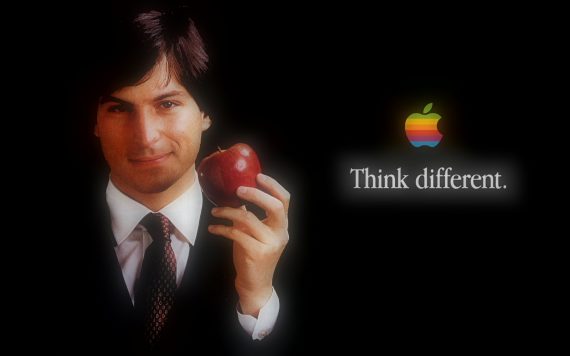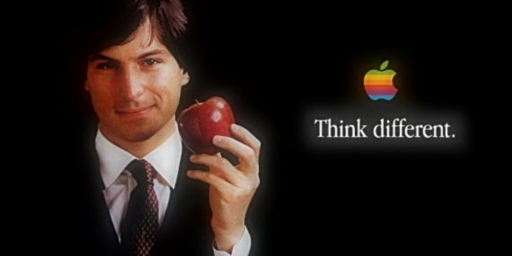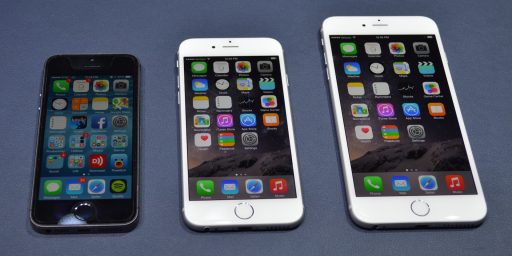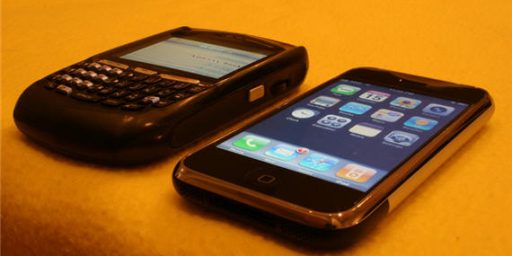Apple Co-Founder Steve Jobs Dead At 56
The co-founder of one of the most successful technology companies ever has passed away after a years-long battle with cancer:
Steve Jobs, the demanding visionary who understood before anyone else how deeply we would live our lives through our devices, has died at the age of 56, only weeks after resigning as chief executive of computer giant Apple Inc. for health reasons.
Jobs revitalized Apple by transforming smartphones, computers, and media players into objects of desire. He insisted the company put the human experience first, focusing on design as well as technological prowess. Fifteen years ago,Apple flirted with bankruptcy; today, it is one of the most successful companies on earth. Only oil titan Exxon Mobil Corp. is worth more.
“He taught all of us how to transform technology into magic,” said John Sculley, Apple’s chief executive in the mid-1980s, and the man who once had Jobs kicked out of the company he’d co-founded.
After he was ousted, Jobs endured a decade of exile. But the experience taught him lessons that would, once he returned, help him lead Apple to unimaginable heights of achievement.
“Steve’s big contribution to the computer industry was to take it away from the nerds and give it to the people,” said Bob Metcalfe, co-inventor of Ethernet networking technology and a professor at the University of Texas at Austin.
Jobs was born in San Francisco on February 24, 1955 to Syrian immigrant Abdulfattah John Jandali and Joanne Schieble, both graduate students at the University of Wisconsin in Madison.
In an interview with the New York Post in August, Jandali, now 80 and vice president of a casino in Reno, Nev., said Schieble gave Jobs up for adoption because her father would not allow her to marry him.
But only a few months after the baby was adopted by Paul Jobs, a machinist, and Clara Jobs, an accountant, Schieble’s father died, and she married Jandali. The couple had another child. Jobs didn’t meet his biological sister for more than 30 years.
Jobs attended high school in Cupertino, Calif, the town where Apple would later be headquartered. Graduating in 1972, he went to Reed College in Oregon, but dropped out after one semester. He remained at the a campus hanger-0n for another year, taking the occasional philosophy course. Jobs returned to California in 1974, and took a job at videogame company Atari Inc. After a few months, he resigned and traveled to India in search of spiritual enlightenment.
By 1975, Jobs was back in California, where he was active in a local computer club. The most prominent member was a young man named Steve Wozniak, who had a knack for building homemade computers. Jobs and Wozniak b uilt a prototype machine in the garage of Jobs’ parents, and in 1976, they co-founded Apple Computer. to sell their machines. T
They sold hundreds of the original Apples, but their next machine, the much more capable Apple II, remained in production for 16 years and launched the personal computer industry.\
From The San Francisco Chronicle:
Steve Jobs, the iconic Apple co-founder who reshaped the world’s digital landscape, died Wednesday, ending a storied career that saw him ousted from the company he co-founded only to return from exile to lead the Apple to greater glory with the iPod, iPhone and iPad. He was 56.
Jobs, who stepped down as CEO earlier this year for health-related reasons, had suffered for years from pancreatic cancer and related illnesses and in 2009 underwent a liver transplant. His death was announced by Apple.
“Steve’s brilliance, passion and energy were the source of countless innovations that enrich and improve all of our lives. The world is immeasurably better because of Steve,” the board of directors said in a statement.
Jobs was considered by many to be the greatest corporate leader of the last half century, and indeed his numerous successes rank him alongside Ford, Disney and Edison as a giant of American business.
He was a taskmaster who demanded the most from his employees – often in expletive-laden bursts – and wasn’t afraid to scrap products that didn’t meet his expectations. But consumers benefited from his perfectionism, which resulted in beautiful and intuitive products.
Under Jobs, Apple devices helped to change the way consumers buy music, read books and enjoy movies. Jobs himself dragged those industries, sometimes kicking and screaming, into the digital future. The products created during his tenure gave rise to a legion of fans who proselytize on the company’s behalf, demonstrating loyalty rarely granted to a maker of electronic gadgets.
From The New York Times:
Beginning in 1986, Mr. Jobs refocused NeXT from the education to the business market and dropped the hardware part of the company, deciding to sell just an operating system. Although NeXT never became a significant computer industry player, it had a huge impact: a young programmer, Tim Berners-Lee, used a NeXT machine to develop the first version of the World Wide Web at the Swiss physics research center CERN in 1990.
In 1996, after unsuccessful efforts to develop next-generation operating systems, Apple, with Gilbert Amelio now in command, acquired NeXT for $430 million. The next year, Mr. Jobs returned to Apple as an adviser. He became chief executive again in 2000.
Shortly after returning, Mr. Jobs publicly ended Apple’s long feud with its archival Microsoft, which agreed to continue developing its Office software for the Macintosh and invested $150 million in Apple.
Once in control of Apple again, Mr. Jobs set out to reshape the consumer electronics industry. He pushed the company into the digital music business, introducing first iTunes and then the iPod MP3 player. The music arm grew rapidly, reaching almost 50 percent of the company’s revenue by June 2008.
In 2005, Mr. Jobs announced that he would end Apple’s business relationship with I.B.M. and Motorola and build Macintosh computers based on Intel microprocessors.
By then his fight with cancer was publicly known. Apple had announced in 2004 that Mr. Jobs had a rare but curable form of pancreatic cancer and that he had undergone successful surgery. Four years later, questions about his health returned when he appeared at a company event looking gaunt. Afterward, he said he had suffered from a “common bug.” Privately, he said his cancer surgery had created digestive problems but insisted they were not life-threatening.
Apple began selling the iPhone in June 2007. Mr. Jobs’s goal was to sell 10 million of the handsets in 2008, equivalent to 1 percent of the global cellphone market. The company sold 11.6 million.
Although smartphones were already commonplace, the iPhone dispensed with a stylus and pioneered a touch-screen interface that quickly set the standard for the mobile computing market. Rolled out with much anticipation and fanfare, iPhone rocketed to popularity; by end of 2010 the company had sold almost 90 million units.
Although Mr. Jobs took just a nominal $1 salary when he returned to Apple, his compensation became the source of a Silicon Valley scandal in 2006 over the backdating of millions of shares of stock options. But after a company investigation and one by the Securities and Exchange Commission, he was found not to have benefited financially from the backdating and no charges were brought.
The episode did little to taint Mr. Jobs’s standing in the business and technology world. As the gravity of his illness became known, and particularly after he announced he was stepping down, he was increasingly hailed for his genius and true achievement: his ability to blend product design and business market innovation by integrating consumer-oriented software, microelectronic components, industrial design and new business strategies in a way that has not been matched.
If he had a motto, it may have come from “The Whole Earth Catalog,” which he said had deeply influenced him as a young man. The book, he said in his commencement address at Stanford in 2005, ends with the admonition “Stay Hungry. Stay Foolish.”
“I have always wished that for myself,” he said.
Jobs and Wozniak were the modern day versions of the inventor working alone in their lab, and what they created has helped change the world. Jobs himself displayed a kind of business genius that you don’t see very often. When he introduced the iPod, then the iPhone, and then the iPad, he managed to create products that we didn’t know we needed or wanted, and he’s left a mark not just on the computer industry, but also on films, music, and television.
One of Jobs’ s biggest business rivals back in the day has released this statement:
Bill Gates, the former chief executive of Microsoft, said in a statement that he was “truly saddened to learn of Steve Jobs’s death.” He added: “The world rarely sees someone who has had the profound impact Steve has had, the effects of which will be felt for many generations to come. For those of us lucky enough to get to work with him, it’s been an insanely great honor. I will miss Steve immensely.”
PALO ALTO, Calif.–(BUSINESS WIRE)–Steve Jobs’ family today made the following statement regarding his death:
Steve died peacefully today surrounded by his family.
In his public life, Steve was known as a visionary; in his private life, he cherished his family. We are thankful to the many people who have shared their wishes and prayers during the last year of Steve’s illness; a website will be provided for those who wish to offer tributes and memories.
We are grateful for the support and kindness of those who share our feelings for Steve. We know many of you will mourn with us, and we ask that you respect our privacy during our time of grief.
More to come, I’m sure






Sad. IMO Jobs’ contribution was that obsessive visual design was, in fact, justified.
(Prior to his return to Apple, “human interface” had been given to the cognitive psychologists. Steve fired them all, and just concentrated on what was beautiful.)
(Google “insanely great” to get the tribute within a tribute from Gates.)
A great man. A sad day at our house.
I’m only shocked that it’s so soon after he resigned. On the other hand, I know how fast the last few weeks of cancer goes downhill. Rest in peace, smart guy.
Ouch.
Jobs was arguably the best American of his generation.
He will be missed.
@ponce:
I’m sorry he’s dead, but seriously?
You knew this was coming given the nature of his disease and a recent picture I saw. Its not a time for politics, but just to observe that he made a difference with his life, and we should all recognize that and endeavor to do the same.
A very sad day. There are a lot of visionaries, but the ability to see that clearly and translate vision into reality is so rare. Walt Disney was probably the last talent of that magnitude before Jobs arrived on the scene.
He was an inspiration – I will miss him.
I hate passionately what he did to the world of smartphones, but it’s impossible to deny that he gave people what they didn’t realize they wanted. That takes genius. And he got the record labels on board with digital music, which was a really neat trick.
That was his big contribution, but of course he was wrong. All he did was help cheapen society by making computer just another fashion accessory. Thanks a lot, Steve.
GENIUS.
[posted from an iPhone]
That’s the face I remember.
It is sad. He changed the world in a lot of ways. The iPod is one of the great inventions of all time.
That said, message to all those bastards on Wall Street busy beggaring the country to amass a few hundred million more:
This man who deserved to live past 100 died in what these days is barely middle age — and all his billions couldn’t do a thing about it.
That cash can’t keep you warm and won’t keep you alive. Live like a human, not a ledger.
I would trade you all to give him one more good year.
@WR:
His money most likely kept him alive. He could afford the best doctors there are, the best treatments. And he had a private plane that enabled him to fly to Tennessee for a liver.
But money won’t keep anyone alive forever. At least not yet.
@PJ:
o/~ You’re dead for a long, long time / You just can’t prevent it / So if money can’t buy happiness / I guess I’ll have to rent it…. o/~
this is a huge loss to the tech community and to the world in general!
@Tlaloc:
If you don’t like his stuff, you can buy from the people who follow from him, imperfectly:
windows, ubuntu, android … I say that as an ubuntu/android user.
(I’m pretty sure there were MP3 players before iPod, but that obsessive design made a difference.)
In the spirit of a wake, I will tell one of my Steve Jobs stories. I was working at a company that made diskette copiers. Back when everything came on floppies there had to be machines, big and small, that took in stacks of blank disks, and kicked out ones with an OS or a game on them. We’d just made a small model for the relatively new 3.5″ disk, and my friend, the mechanical engineer, took it up to Apple. He was talking to his counterpart, an Apple engineer, when “this dirty hippy comes in, walks right between us, and opens up my copier. He says ‘this is crap, this is crap!'” My friend expects his counterpart to throw the guy out, but he’s amazed that the Apple engineer is now nodding his head. The hippie leaves and the engineer says “that was Steve.” I think we sold them a few of the machines …
At first I took that as a “Steve is weird story.”
It wasn’t until a year or two later that it really registered … our design was crap.
(Actually, it might have been “sh*t”, making the scene that much weirder.)
@Franklin:
Actually this was exactly what I expected. Th only reason he resigned was that he knew that this was so near. Otherwise he would still be CEO.
And I agree that the money extended his life, but he was the type of person who was kept alive by work.
Personally, I think the app store will ultimately be his greatest legacy (beyond his brilliant design sense).
May all beings without exception be released from suffering, and find true happiness and everlasting peace… Fair-well you magnificent bastard.
I think that technically BeOS had the first App Store … but it part of Jobs’ product design to seize it 😉
@john personna: There were quite a few GOOD MP3 players before the Ipod they just didn’t look as good..
When I saw that he had resigned I knew he was going to die soon. He wasn’t the type to walk away from Apple without a very very good reason.
Odd how his actual life ran directly afoul of his liberal politics. Jobs was, in my view, an example of American exceptionalism. Says Billy Beck:
Exactly. And think; If the “occupy Wall Street” morons had their way, people like Jobs, and the gains we made by way of people like him, wouldn’t exist.
@john personna:
For more tributes check out http://www.pixt.com/remembersteve
Tons of cool stuff there…you can even upload your own tribute!